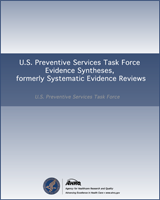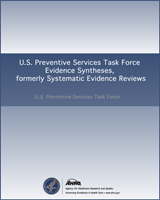NCBI Bookshelf. A service of the National Library of Medicine, National Institutes of Health.
Dehmer SP, Maciosek MV, Flottemesch TJ. Aspirin Use to Prevent Cardiovascular Disease and Colorectal Cancer: A Decision Analysis: Technical Report [Internet]. Rockville (MD): Agency for Healthcare Research and Quality (US); 2015 Sep. (Evidence Syntheses, No. 131s.)
This publication is provided for historical reference only and the information may be out of date.

Aspirin Use to Prevent Cardiovascular Disease and Colorectal Cancer: A Decision Analysis: Technical Report [Internet].
Show detailsCardiovascular disease (CVD) and cancer are the leading causes of deaths in the United States, and combined, the diseases accounted for more than half of all mortality in 2010.1 In any given year, approximately 635,000 Americans will suffer their first coronary attack, 610,000 will suffer their first stroke, and one-third of all cardiovascular deaths will occur among persons younger than 75 years old.2 Among cancers, colorectal cancer (CRC) is the third most common and deadly, accounting for about 8 percent of all new cases and deaths.3 In economic terms, CVD and CRC account for more than $200 billion in direct medical costs annually, and the indirect costs from lost productivity and premature mortality are estimated to exceed at least another $100 billion.2,4,5
Evidence for the effectiveness in preventing recurrent complications from heart disease and stroke is believed to be strong,6,7 but the evidence for aspirin's net benefit in preventing CVD and cancers, including CRC, in healthy individuals has been more mixed.7-12 Three recent systematic reviews conducted on behalf of the United States Preventive Services Task Force (USPSTF) investigated the current evidence for the benefits and harms of aspirin in the primary prevention of CVD, all-cause mortality, all cancers, and CRC.13-15 These reviews identified evidence of aspirin's effectiveness in preventing first-time myocardial infarction and ischemic stroke—now for both men and women—and found new evidence indicating aspirin's effectiveness in preventing CRC. However, the updated reviews also reaffirm aspirin's role in increasing risk for major gastrointestinal (GI) bleeding and hemorrhagic stroke.
The central clinical dilemma faced when deciding whether aspirin is appropriate for the primary prevention of CVD and CRC is an uncertain relationship between the benefits and harms of long-term aspirin use. The reductions in relative risk are sizable, but in comparison with secondary prevention, the number of treated persons needed to prevent a single first event are relatively large. The objective of this study is to conduct a decision analysis using simulation modeling to better inform clinical guidance by assessing the expected net benefit of aspirin use for primary prevention across clinically relevant population groups defined by their age, sex, and underlying CVD risk characteristics. The results of this study are intended to support a USPSTF review—and possible update—of the 2009 recommendation on aspirin use.9
- Introduction - Aspirin Use to Prevent Cardiovascular Disease and Colorectal Canc...Introduction - Aspirin Use to Prevent Cardiovascular Disease and Colorectal Cancer
- Homo sapiens major histocompatibility complex, class II, DQ beta 1, mRNA (cDNA c...Homo sapiens major histocompatibility complex, class II, DQ beta 1, mRNA (cDNA clone MGC:20093 IMAGE:4574913), complete cdsgi|15082384|gb|BC012106.1|Nucleotide
- Homo sapiens RNA polymerase II mRNA, complete cdsHomo sapiens RNA polymerase II mRNA, complete cdsgi|4164098|gb|L37127.1|HUMRPIANucleotide
Your browsing activity is empty.
Activity recording is turned off.
See more...
